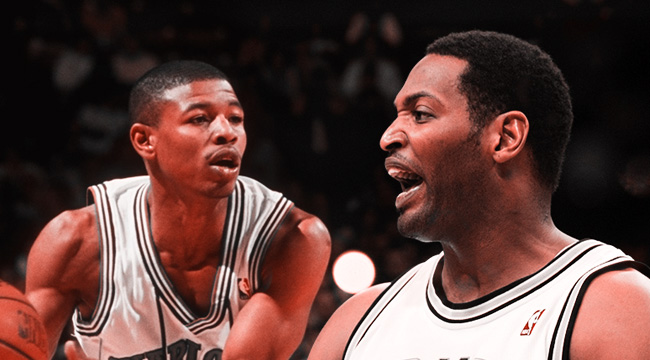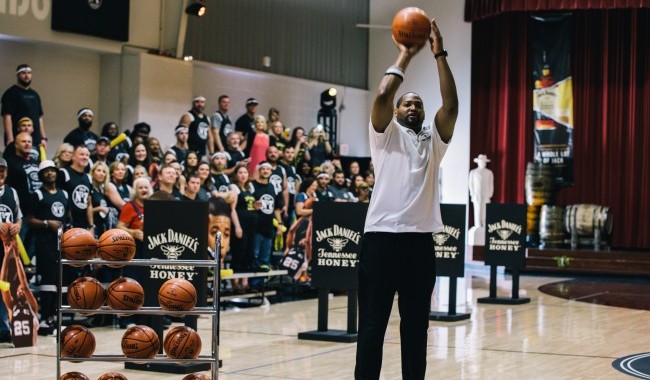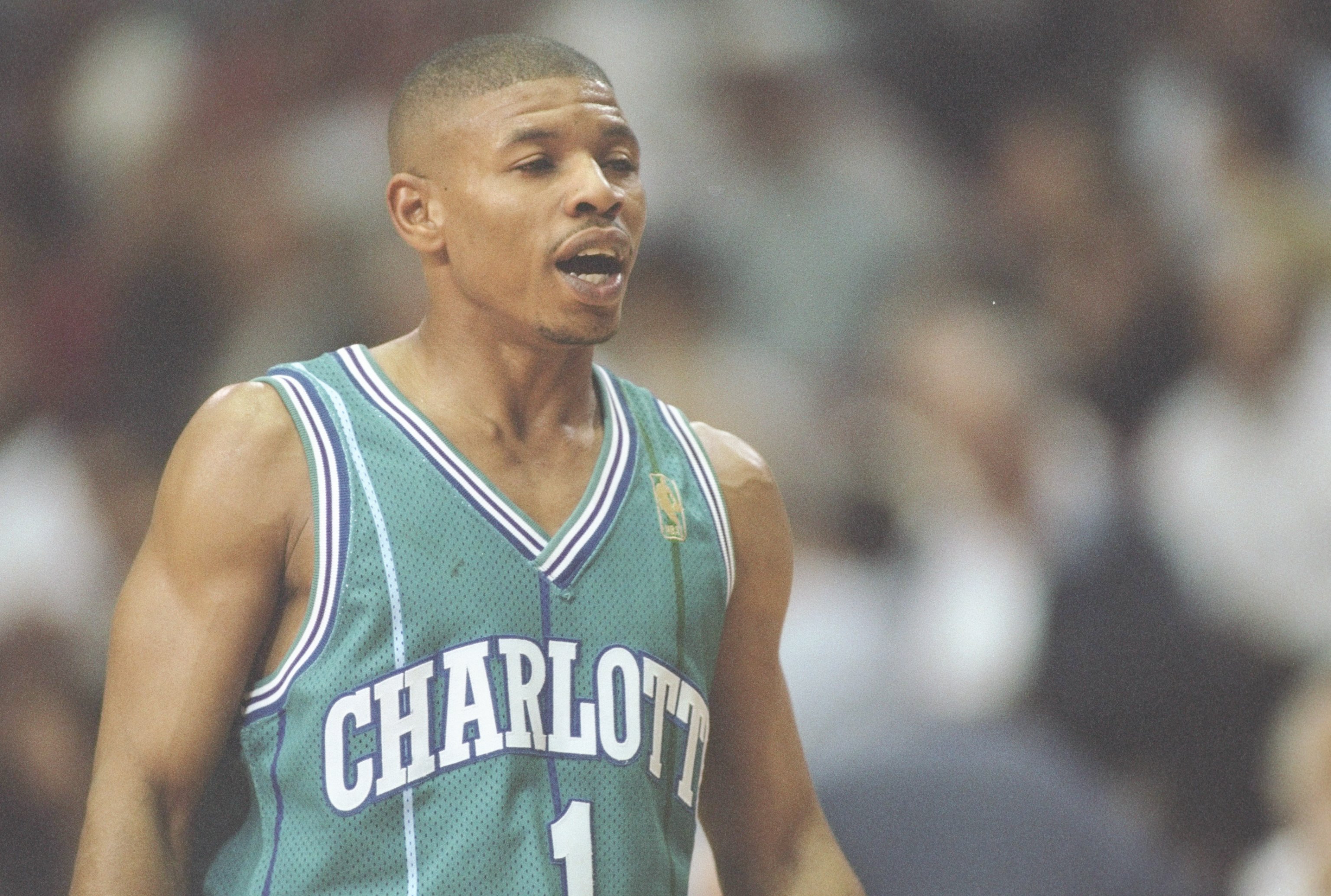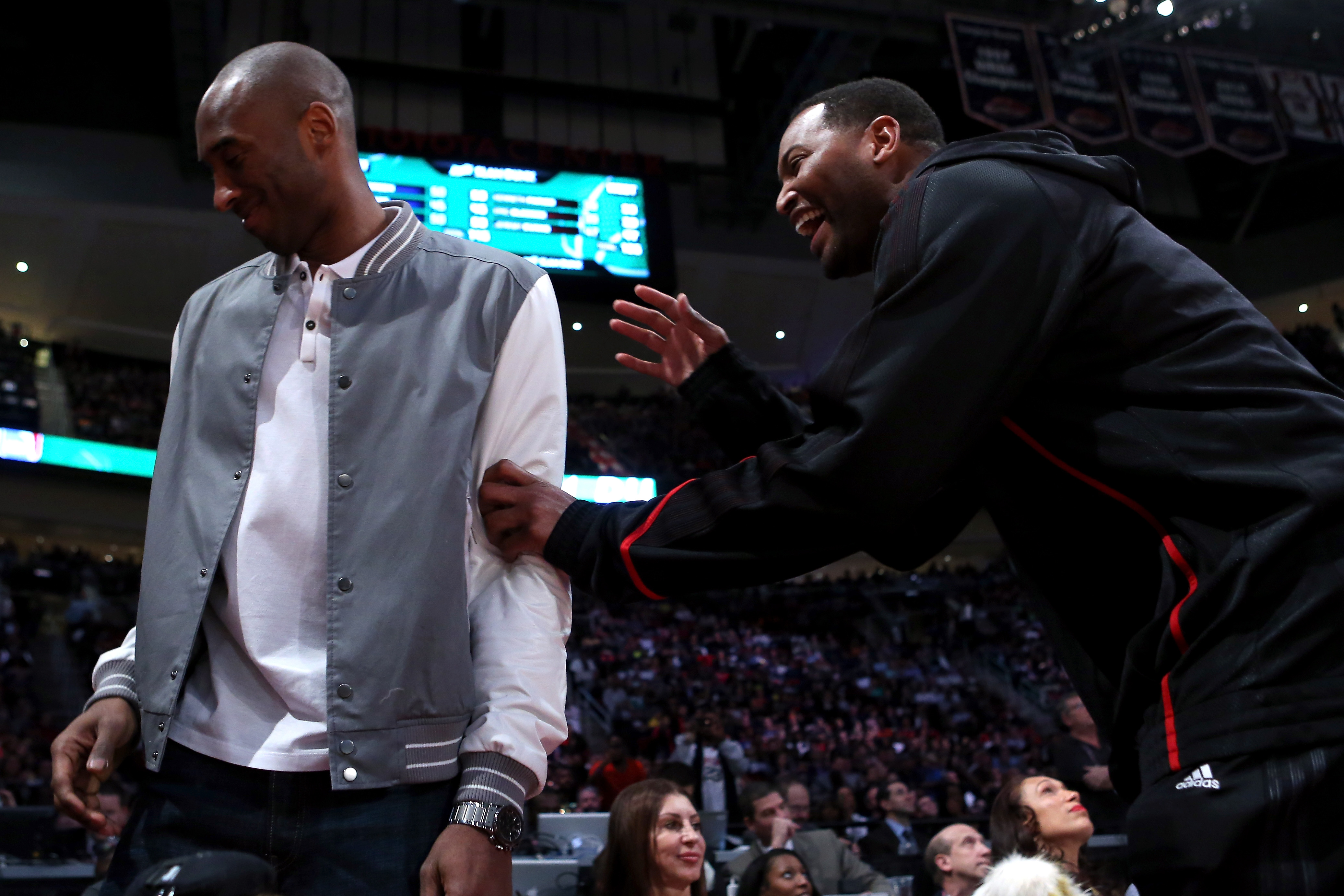
LYNCHBURG, Tenn. – Like everyone else, Muggsy Bogues and Robert Horry can’t help but talk about LeBron. Like everyone else, they have their own thoughts about where James should play. But like everyone else, Bogues and Horry have to admit they have no idea what LeBron is going to do. Staring across from each other at a dinner in the Motlow House adjacent to the Jack Daniel’s distillery, the two NBA fixtures make their case.
“If he wants to win,” Bogues says, “he’s got to go to Houston. Join Chris and Harden. They were already that close this year.”
Horry pauses between bites to listen, then offers his rationale.
“Not LeBron,” Horry replies. “He can’t join anybody. He’s LeBron. He’s either got to build something in Los Angeles or stay in Cleveland and bring people to him.”
It’s a playful conversation, much more calm and steady than anything you’d see on Twitter or hear on sports talk radio, but Horry and Bogues can’t help themselves. LeBron is the talk of the offseason — even after being swept by the Warriors — and both former players have made it a priority to stay around the game as much as possible.
Bogues and Horry can’t see themselves leaving basketball, at least not permanently. Both have devoted plenty of time to their families and personal passion projects, but when you play a collective 30 seasons in the NBA, basketball is what you know and keep coming back to. Bogues holds youth camps in Charlotte and recently took on a position as an ambassador for the Hornets. Horry coaches AAU and is a Lakers analyst for Spectrum SportsNet. The pair frequently participate in NBA Cares events and travel to grow the game globally, whether that be in India, China, England, or elsewhere.
Answering the call is what brought Horry and Bogues to Tennessee the day after the 2018 NBA Draft to take part in the Jack Daniel’s NBA Legends Camp, where they went on a tour, met with master distiller Jeff Arnett, and coached up two teams during a skills competition in a repurposed church that now serves as the company’s rec facility (complete with a NBA-quality court).
Bogues and Horry gave the small town of Lynchburg star power, as anyone walking by (employees or otherwise) stopped, took pictures, shook hands, and whispered to themselves. Seemingly half the population of 600 was involved in some capacity over the course of the weekend, and while admittedly it was a different sort of experience from what Bogues and Horry are used to, they still seemed to enjoy themselves between family style Southern meals, tastings, and going one-on-one in their own skills challenge (Bogues won). The event was yet another test for the NBA as it continues to try to leverage those league partnerships for maximum effect.
As with anything else the NBA does these days, the question they want to answer is always the same: “How can we grow the game?”

Involving former players is, and will continue to be, critical. It’s something the major sports leagues have struggled with at times. Trotting players out to give hot takes is easy, but involving them in big decisions and honoring the time they put in to get the sport where it is today requires significant investment and foresight. Legends help bridge the past to the future, but on a strictly human level, they need the game of basketball for their own identities, and they want to believe they can trust the game to be a safety net for them. As the NBA gains more of a reputation as a socially conscious league – a point Oscar Robertson made eloquently after being honored for a Lifetime Achievement at the NBA Awards show on Monday – former players can’t be left behind.
Bogues spoke frequently throughout the weekend about the friends and teammates he’s lost at too early an age. Both he and Horry keep up with the CBA and how it affects retired players. They believe staying connected and continuing to be present for the young players who are coming up helps to strengthen that relationship, so that those young players realize the simple fact that someday they’ll be in the same place the retired players are now.
Dime sat down with Bogues and Horry in Tennessee, as they expounded on these issues, life after basketball, and more.
DIME: Muggsy, you’ve been doing more with the league and representing the league, whether it’s globally or here at home. Robert, you’ve been doing the same thing. What does it mean to you guys to continue to be stewards for the game?
Muggsy Bogues: To have an opportunity to go around the world, to represent the NBA, their product and their partnerships and so forth, has been an honor for us. I mean, it’s just come full circle for us. We played the game so long and you know, the relationships that we’ve been able to build, and how we was conduct ourselves and represent ourselves, it’s come full circle. So for the NBA to reach out to us to make us part of their family, continue to spread the word and spread the goodness of what the NBA is doing. It’s just a great opportunity, reaching so many kids, especially for me having the opportunity to give them that opportunity for them to believe in themselves, to feel like that they become more, if they want it to become their life. So it’s a great honor for me to go around and still spread my message as well as represent the NBA.
Robert Horry: I think when you look at the number of players who retire or stop playing, and the NBA actually chose us two to be the ambassadors for this grand event is humbling. I think you look at it also as a fact that we represented ourselves, and our families, in the league, in the right way, and I think that’s rewarding because this is a kind of a reward for, I can speak for me, for myself, to be able to be a part of an inaugural event like this and still be able to travel around the world and spread the word of the NBA, the NBA Cares program, the educational program, you know, it’s just fantastic to be a part of and go out and just keep being a part of the NBA family. There’s a lot of organizations that once you’re done they could say bye bye to you, but the NBA has embraced us and kept us a part of the family, and we’re just going around having a good time, and also spreading the good word.
Muggsy: That’s super solid. That was super solid.

I noticed something, I don’t remember who I was talking to, somebody who got drafted last year, one of that class, and they had talked about events that former players had put on when they were kids in camp. And I don’t think I really had thought about it at the time that now we have that distance between guys who are no longer playing, but it doesn’t feel like it was that long ago. But now you’re actually impacting players who have grown up and gotten themselves in the league. When you look at everything that’s changed in the game, what’s the biggest difference that you’ve seen in, not necessarily style of play, because styles come and go, but the off court stuff that the game has had the opportunity to influence societally?
Bogues: I think for me it’s the way social media has blown up the game and players, you know, so many player’s brand has gone beyond above what you you ever thought it would because of social media and the way they have that outlet to put themselves out there and it’s allowed them to make more money, you know, for themselves and for their families. So that’s, that’s a huge part of what’s happening today with us that we didn’t have. We had maybe two or three cameras in an arena, but now they got 2,300 cameras in the arena and the fact that you have more eyes on you, and I think the players are handling it very well because a lot of times players can want to drift to the left or drift to the right. But with those cameras on them they had to do the straight and narrow. So I think that’s the biggest change.
Horry: Of course the speed, and the love of three-ball, as far as what’s happening in the game has changed, but I think, I don’t know if I could do it, it’s just having so many eyes on you, it’s been a lot more pressure. And I’m able to handle pressure, but it’s a lot of pressure from the social media because there’s no breaks. If you go out eating a burger or something, people think “he was eating over here.” I’m like, well, “can I just go eat a burger and be in peace?” It’s scrutinized from your weight, to your shoes, what you wear, and it’s just a tough society and I think these guys are handling it very well.
Bogues: And I think they’re using it for their own benefit. The guys are using this platform and I don’t know, sometimes they’re using it for social issues and advocacy issues as well. And just being engaged and understanding, it’s not just on the court. You’ve gotta continue to represent yourself off the court and continue to showcase who you, your family, and what the league is all about. And social media, has really brought that microscope to you. So now you’ve got to be careful, but you’ve just got to use it in the right way.
One of the rsituations players have the opportunity now is when they affect the CBA, both from a retired standpoint and active players. There’s been more focus on actually helping retired players, and I know that’s something you guys are both super passionate about. What has that done, and what else can be done, to continue to help those guys who played in the past and maybe haven’t gotten their due, or haven’t gotten exactly what they needed previously?
Bogues: Well, the current players are really starting to understand the importance of once they’re going to be on this side one day, soon. But it’s been going on for quite some time with the CBA. But now that the guys are becoming more of a partner in getting the fair share that they feel like is just due to them, and they become more knowledge about the business side of it, and looking for more of a sharing partnership. And I think they’ve come in closer and closer to that. And that’s what’s allowing the game to grow. We’re over in 300-something countries. There’s no delayed games. We’re actually watching it live which didn’t happen in the past. So I mean, this is truly an opportunity where things are starting to become more of a global brand, which the NBA is always looking in terms of, for the future.

Horry: And for me, it’s just like, it’s a trickle down effect. You see that the guys are understanding that, like Muggy’s saying, one day they’re going to be on this side. And I think a lot of that has to do with, if you look in the league, there are a lot of guys in the league that were, their sons are former players. They have some associations with the players where, like you said, they run across at camp and that’s the thing that they understand, like “oh, well my dad, he’s this and this,” and they may not be able to handle or afford it, but they can afford it now because of the league, you know. And I look at the rash of deaths we had and it caused the NBA to really step up and do something as far as health care when you retire, and I think that was the biggest thing that the NBA realized, that we have family members dying because they can’t afford to go get check-ups because those guys who passed away weren’t making the money that Muggsy and I made, or definitely not making the money that they guys are making now. So they realized that, hey, we need to do something to step up.
Bogues: And I think that’s part of the collective bargaining agreement that the players would understand, like hey, these are players that we used to admire and they’re passing away for no reason. It goes back to when you say, the NBA Cares, that’s a part of the whole brand of the program, that the players are understanding that we need to take care of our family. Even though I’m not on the current roster or current team, or involved with a current team, I’m still a part of the NBA family because those guys are what led the path, led the way to where I am to be allowed to do the things I’m doing today. And I think they’re appreciative of that.
You’re both are still so involved in the game of basketball, and I don’t think there’s any way that you both could imagine doing anything else. Is that just something that has stuck with you? Or is it this family that you guys have, and this structure, this support system that makes it your identity? It’s kind of, interwoven into you.
Horry: Well, it is. You know, we venture into multiple things as you play and especially as you retire, but basketball is our life and it’s just something that we’ve been doing since I was three years old. And I was fortunate enough to make a career out of it. So having this platform to continue to grow, to continue to use as our financial means as well as a passion, is always a part of me. So I’m just grateful to still be part of it, to still be able to give back whichever way I possibly can. Knowledge wise or time wise or what have you. But just being around it, I’m just grateful and honored and humbled to still be part of this fraternity that I’m part of.
Bogues: It’s a great family to be in. So many people that grow up wanting to be in this family, a part of this organization, a part of this brand. And to be able to represent yourself, and the brand, and your family in the right way, to stay amongst the guys that are allowed to travel the world, go to different places, go to different events, and to be a part of it, and still be able to spread the goodwill and say, “hey, I was able to do these things because the NBA opened this door for me. Now let me shine a little light on you, a little knowledge to try to help you along the way.”
Horry: I just think about how funny it is when, you know, I see pictures of guys that I took pictures with like James Harden, Jordan Farmar, all these guys. Then they’re in the league later. It’s just shows you that they looked up to you. They say okay, I want to be like this guy. This guy took time to take a picture with me. It’s a motivating thing, you know what I’m saying? One day I want to be in reverse. I want to be taking a picture with some kid that I’m going see on that stage one day. You’ve just got to represent yourself and the whole brand right, and just basically spread the word and just try to be a good human being.
How does it feel to be immortalized in a song like Nas “Can’t Forget About You,” or name checked in other song lyrics?
Horry: You know what’s that funniest part, is like, I don’t really check my social media that much, but if I do check it, every time I look up somebody’s saying “H-Town to Cali just like Robert Horry,” you know, the Z-Ro freestyle, and then Travis Scott saying my name. I think it’s humbling, but my kids get a kick out of it more than anything. They’re like, “Dad, did they say your name?” I’m like, yeah. Sometimes I say, you do realize I played in the NBA and I won seven championships. I said, “Dad wasn’t no slouch man, he wasn’t no bum, right?”
I remember the first time I heard it, it was with Z-Ro in Houston, you know, a huge hometown rapper and the next time, it’s a world-wide name like Lil Wayne. When Lil Wayne mentioned my name in a song, I was like, “oh, I made it. I made it.” You know, so it’s humbling, it’s funny. I remember meeting him at a Hornets game when it was in New Orleans. I just went up to him and said, thank you for mentioning me. He was like, my pleasure. And it’s just, it’s kind of like a door that opens up to another entertainment world. Because we’re entertainers, and they’re entertainers in a different ield. But it was fun to just to get to know those guys and it lets you know that you did something that left an impact on them.
Muggsy, a similar situation with you on the Space Jam thing. I bet more people bring that up than anything else these days.
Oh yeah, from 18 years old and down, that’s all they know me as, Space Jam. Kids always ask me, do I still have my powers? So it’s great to just to be still recognized and it’s such an iconic, classic movie that they made and it’s a family movie. To be able to take part in that was amazing, but I did so many things with Curb Your Enthusiasm and Eddie and all that, so, just spreading my wings. But it’s humbling, and you know I had an opportunity with A Tribe Called Quest, they mentioned me in a song. When you hear that, again like Rob said, it’s very humbling.
Horry: Don’t forget Family Feud.
Bogues: Oh, Family Feud. Oh, man, that was one of the most fun experiences we have ever experiences we have ever encountered. We got our butts kicked, but we had fun. And I’ll tell you, Steve Harvey, behind the scenes, is just hilarious. But it’s just great for me. I’m just humbled, to have opportunities for people to appreciate all the things that I’ve done, so I’m just thankful for that.
Dime was invited on a hosted trip by Jack Daniel’s to interview Robert Horry and Muggsy Bogues.






